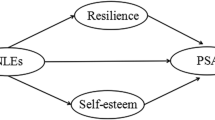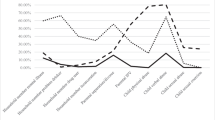Abstract
In this study, we examined the impact of childhood interpersonal adversity on adulthood subjective well-being (SWB), with a focus on the mediating and moderating effects of social support and socioeconomic status (SES). We concentrated on parental maltreatment (abuse and neglect) and bullying in school as childhood adversity variables and on perceived happiness and self-rated health as adulthood SWB measures. Our empirical analysis was based on micro data from a survey in municipalities in and around the Tokyo metropolitan area (N = 3,292). We obtained four key findings. First, the experience of childhood adversity had a substantial negative impact on adulthood SWB. Second, social support and SES significantly mediated the impact of childhood adversity. Third, however, a large proportion of the impact of childhood adversity remained unexplained by their mediation effects. Fourth, social support and SES did not moderate the impact of childhood adversity. Hence, we can conclude that childhood adversity affects adulthood SWB in a relatively independent manner rather than being substantially mediated or moderated by social support or SES. Accordingly, social policies should aim at reducing incidents of childhood maltreatment and bullying in addition to helping people enhance levels of social support and SES in later life.
Similar content being viewed by others
References
Afifi, T. O., Enns, M. W., Cox, B. J., Asmundson, G. J., Stein, M. B., & Sareen, J. (2008). Population attributable fractions of psychiatric disorders and suicide ideation and attempts associated with adverse childhood experiences. American Journal of Public Health, 98, 946–952.
Arseneault, L., Bowes, L., & Shakoor, S. (2010). Bullying victimization in youths and mental health problems: ‘Much ado about nothing’? Psychological Medicine, 40, 717–729.
Baron, R. M., & Kenny, D. A. (1986). The moderator-mediator variable distinction in social psychological research: Conceptual, strategic and statistical considerations. Journal of Personality and Social Psychology, 51, 1173–1182.
Benjet, C., Borges, G., & Medina-Mora, M. E. (2010). Chronic childhood adversity and onset of psychopathology during three life stages: Childhood, adolescence and adulthood. Journal of Psychiatric Research, 44, 732–740.
Bowles, S., Gintis, H., & Groves, M. O. (2005). Unequal chances: Family background and economic success. Princeton: Princeton University Press.
Brown, G. W., Craig, T. K. J., Harris, T. O., & Handley, R. V. (2008). Parental maltreatment and adulthood cohabiting partnerships: A life-course study of adult chronic depression—4. Journal of Affective Disorders, 110, 115–125.
Carneiro, P., & Heckman, J. J. (2003). Human capital policy. In J. J. Heckman & A. Krueger (Eds.), Inequality in America: What role for human capital policies (pp. 77–239). Cambridge: MIT Press.
Clark, A. E., & Oswald, A. J. (1994). Unhappiness and unemployment. Economic Journal, 104, 648–659.
Collishaw, S., Pickles, A., Messer, J., Rutter, M., Shearer, C., & Mughan, B. (2007). Resilience to adult psychopathology following childhood maltreatment: Evidence from a community sample. Child Abuse and Neglect, 31, 211–229.
Corso, P. S., Edwards, V. J., Fang, X., & Mercy, J. A. (2009). Health-related quality of life among adults who experienced maltreatment during childhood. American Journal of Public Health, 98, 1094–1100.
Currie, J., & Widom, C. S. (2010). Long-term consequence of child abuse and neglect on adult economic well-being. Child Maltreatment, 15, 111–120.
Di Tella, R., MacCulloch, R. J., & Oswald, A. J. (2001). Preferences over inflation and unemployment: Evidence from surveys of happiness. American Economic Review, 91, 335–341.
Duncan, G. J., & Brooks-Gunn, J. (Eds.). (1997). Consequences of growing up poor. New York: Russell Sage.
Duncan, G. J., Yeung, J. W., Brooks-Gunn, J., & Smith, J. R. (1998). How much does childhood poverty affect the life chances of children? American Sociological Review, 63, 406–423.
Durrett, C., Trull, T. J., & Silk, K. (2004). Retrospective measures of childhood abuse: Concurrent validity and reliability in a nonclinical sample with borderline features. Journal of Personal Disorders, 18, 178–192.
Fein, O. (1995). The influence of social class on health status: American and British research on health inequalities. Journal of General Internal Medicine, 10, 577–586.
Ford, E., Clark, C., & Stansfeld, S. A. (2011). The influence of childhood adversity on social relations and mental health at mid-life. Journal of Affective Disorders, 133, 320–327.
Frey, B. S., & Stutzer, A. (2002). What can economists learn from happiness research? Journal of Economic Literature, 40, 402–435.
Fujiwara, T., Kawakami, N., & World Mental Health Japan Survey Group. (2011). Association of childhood adversities with the first onset of mental disorders in Japan: Results from the World Mental Health Japan, 2002–2004. Journal of Psychiatric Research, 45, 481–487.
Gilbert, R., Widom, C. S., Browne, K., Fergusson, D., Webb, E., & Janson, S. (2009). Burden and consequences of child maltreatment in high-income countries. Lancet, 373, 68–81.
Gladstone, G. L., Parker, G. B., & Malhi, G. S. (2006). Do bullied children become anxious and depressed adults? A cross-sectional investigation of the correlates of bullying and anxious depression. Journal of Nervous and Mental Disease, 194, 201–208.
Hardt, J., Sidor, A., Bracko, M., & Egle, U. T. (2006). Reliability of retrospective assessments of childhood experiences in Germany. Journal of Nervous and Mental Disease, 194, 676–683.
Haveman, R., & Wolfe, B. (1995). The determinants of children’s attainments: A review of methods and findings. Journal of Economic Literature, 33, 1829–1878.
Hill, T. D., Kaplan, L. M., French, M. T., & Johnson, R. J. (2010). Victimization in early life and mental health in adulthood: An examination of the mediating and moderating influences of psychosocial resources. Journal of Health and Social Behavior, 51, 48–63.
Horwitz, A. V., Widom, C. S., McLaughlin, J., & White, H. R. (2001). The impact of childhood abuse and neglect on adult mental health: A prospective study. Journal of Health and Social Behavior, 42, 184–201.
Hyde, M., Jakub, H., Melchior, M., Van Oort, F., & Weyers, S. (2006). Comparison of the effects of low childhood socioeconomic position and low adulthood socioeconomic position on self rated health in four European studies. Journal of Epidemiology and Community Health, 60, 882–886.
Jasti, S., Dudley, W. N., & Goldwater, E. (2008). SAS macros for testing statistical mediation in data with binary mediators or outcomes. Nursing Research, 57, 118–122.
Kelleher, I., Harley, M., Lynch, F., Arseneault, L., Fitzpatrick, C., & Cannon, M. (2008). Association between childhood trauma, bullying and psychotic symptoms among a school-based adolescent sample. British Journal of Psychiatry, 193, 378–382.
Kessler, R. C., Davis, C. G., & Kendler, K. S. (1997). Childhood adversity and adult psychiatric disorder in the US National Comorbidity Survey. Psychological Medicine, 27, 1101–1119.
Korpi, T. (1997). Is well-being related to employment status? Unemployment, labor market policies and subjective well-being among Swedish youth. Labour Economics, 4, 125–147.
Laaksonen, M., Rahkonen, O., Martikainen, P., & Lahelma, E. (2005). Socioeconomic position and self-rated health: The contribution of childhood socioeconomic circumstances, adult socioeconomic status, and material resources. American Journal of Public Health, 95, 1403–1409.
Langford, C. P. H., Bowsher, J., Maloney, J. P., & Lillis, P. P. (1997). Social support: A conceptual analysis. Journal of Advanced Nursing, 25, 95–100.
MacKinnon, D. P., Fairchild, A. J., & Fritz, M. S. (2007). Mediation analysis. Annual Review of Psychology, 58, 593–614.
Maher, M. J., Mora, P. A., & Leventhal, H. (2006). Depression as a predictor of perceived social support and demand: A componential approach using a prospective sample of older adults. Emotion, 6, 450–458.
Mavaddat, N., Kinmonth, A. L., Sanderson, S., Surtees, P., Bingham, S., & Khaw, K. T. (2011). What determines self-rated health (SRH)? A cross-sectional study of SF-36 health domains in the EPIC-Norfolk cohort. Journal of Epidemiology and Community Health, 65, 800–806.
McKenzie, S. K., Carter, K. N., Blakely, T., & Ivory, V. (2011). Effects of childhood socioeconomic position on subjective health and health behaviours in adulthood: How much is mediated by adult socioeconomic position? BMC Public Health, 11, 269.
Newsom, J. T., Nishishiba, M., Morgan, D. L., & Rook, K. S. (2003). The relative importance of three domains of positive and negative social exchanges: A longitudinal model with comparable measures. Psychology and Aging, 18, 746–754.
Oshio, T., Sano, S., & Kobayashi, M. (2010). Child poverty as a determinant of life outcomes: Evidence from nationwide surveys in Japan. Social Indicators Research, 99, 81–99.
Pitzer, L. M., & Fingerman, K. L. (2010). Psychosocial resources and associations between childhood physical abuse and adult well-being. Journal of Gerontology: Psychological Sciences, 65B(4), 425–433.
Powers, A., Ressler, K. J., & Bradley, R. G. (2009). The protective role of friendship on the effects of childhood abuse and depression. Depression and Anxiety, 26, 46–53.
Schuster, T. L., Kessler, R. C., & Aseltine, R. H., Jr. (1990). Supportive interactions, negative interactions, and depressed mood. American Journal of Community Psychology, 18, 423–438.
Schwarzer, R., Knoll, N., & Rieckmann, N. (2004). Social support. In A. Kaptein & J. Weinman (Eds.), Health psychology (pp. 158–181). Oxford: Blackwell Publishing.
Seeds, P. M., Harkness, K. L., & Quilty, L. C. (2010). Parental maltreatment, bullying, and adolescent depression: Evidence for the mediating role of perceived social support. Journal of Clinical Child and Adolescent Psychology, 39, 681–692.
Shaw, B. A., & Krause, N. (2002). Exposure to physical violence during childhood, aging, and health. Journal of Aging and Health, 14, 467–494.
Taylor, S. E. (2011). Social support: A review. In M. S. Friedman (Ed.), The Oxford handbook of health psychology (pp. 189–214). New York: Oxford University Press.
Vranceanu, A. M., Hobfoll, S. E., & Johnson, R. J. (2007). Child multi-type maltreatment and associated depression and PTSD symptoms: The role of social support and stress. Child Abuse and Neglect, 31, 71–84.
Weich, S., Patterson, J., Shaw, R., & Stewart-Brown, S. (2009). Family relationships in childhood and common psychiatric disorders in later life: Systematic review of prospective studies. British Journal of Psychiatry, 194, 392–398.
Winkelmann, L., & Winkelmann, R. (1998). Why are the unemployed so unhappy? Evidence from panel data. Economica, 65, 1–15.
Zielinski, D. S. (2009). Child maltreatment and adult socioeconomic well-being. Child Abuse and Neglect, 33, 666–678.
Acknowledgments
The authors thank Prof. Hideki Hashimoto and his team for providing us data from the Japanese Study of Stratification, Health, Income, and Neighborhood (J-SHINE), for which data collection was supported by a Grant-in-Aid for Scientific Research (A) 2009–2013 (No. 20240061) from the Ministry of Education, Culture, Sports, Science and Technology, Japan. Analyses of the data and preparation for the manuscript were supported by a Grant-in-Aid for Scientific Research (A) 2009–2013 (No. 20240062 and 20240063) from the Ministry of Education, Culture, Sports, Science and Technology, Japan.
Author information
Authors and Affiliations
Corresponding author
Rights and permissions
About this article
Cite this article
Oshio, T., Umeda, M. & Kawakami, N. Childhood Adversity and Adulthood Subjective Well-Being: Evidence from Japan. J Happiness Stud 14, 843–860 (2013). https://doi.org/10.1007/s10902-012-9358-y
Published:
Issue Date:
DOI: https://doi.org/10.1007/s10902-012-9358-y




